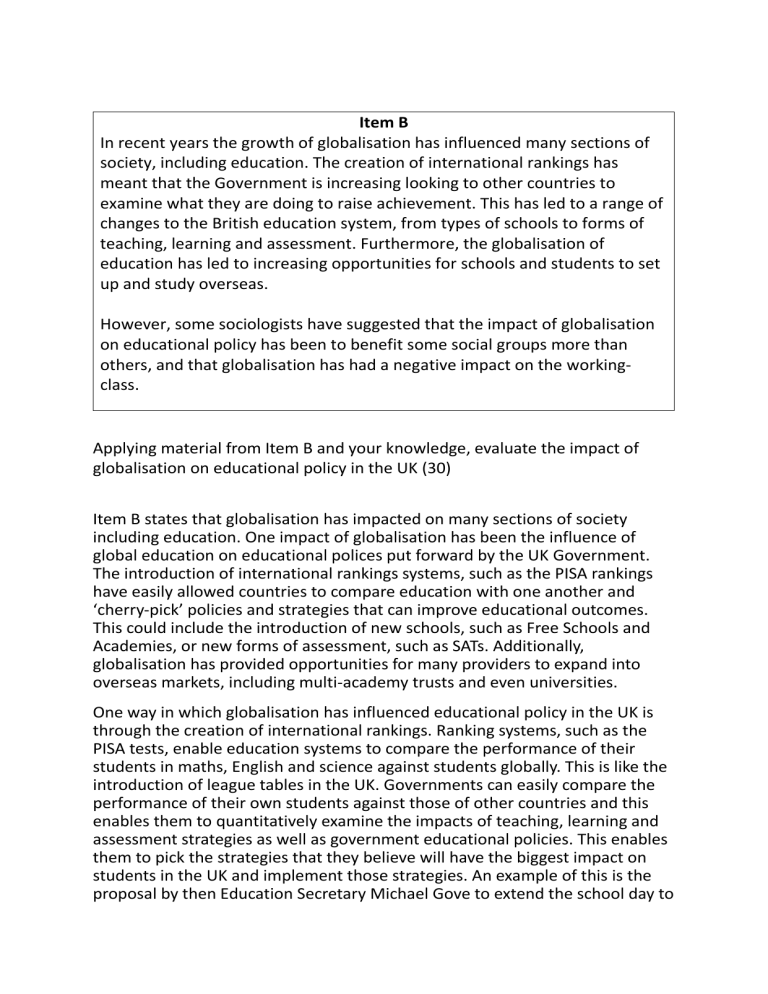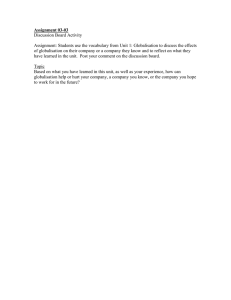
Item B In recent years the growth of globalisation has influenced many sections of society, including education. The creation of international rankings has meant that the Government is increasing looking to other countries to examine what they are doing to raise achievement. This has led to a range of changes to the British education system, from types of schools to forms of teaching, learning and assessment. Furthermore, the globalisation of education has led to increasing opportunities for schools and students to set up and study overseas. However, some sociologists have suggested that the impact of globalisation on educational policy has been to benefit some social groups more than others, and that globalisation has had a negative impact on the workingclass. Applying material from Item B and your knowledge, evaluate the impact of globalisation on educational policy in the UK (30) Item B states that globalisation has impacted on many sections of society including education. One impact of globalisation has been the influence of global education on educational polices put forward by the UK Government. The introduction of international rankings systems, such as the PISA rankings have easily allowed countries to compare education with one another and ‘cherry-pick’ policies and strategies that can improve educational outcomes. This could include the introduction of new schools, such as Free Schools and Academies, or new forms of assessment, such as SATs. Additionally, globalisation has provided opportunities for many providers to expand into overseas markets, including multi-academy trusts and even universities. One way in which globalisation has influenced educational policy in the UK is through the creation of international rankings. Ranking systems, such as the PISA tests, enable education systems to compare the performance of their students in maths, English and science against students globally. This is like the introduction of league tables in the UK. Governments can easily compare the performance of their own students against those of other countries and this enables them to quantitatively examine the impacts of teaching, learning and assessment strategies as well as government educational policies. This enables them to pick the strategies that they believe will have the biggest impact on students in the UK and implement those strategies. An example of this is the proposal by then Education Secretary Michael Gove to extend the school day to mirror the longer hours in east Asian countries like South Korea and Singapore in order to improve student outcomes. However, many critics would suggest that ‘cherry picking’ policies from a nation that is performing well has a limited impact unless other social policies are implemented to compliment the educational policy. For example, Scandinavian countries with more socially democratic ideals tend to perform well but rely upon an expanded welfare state and a more collectivist mentality than is present in the UK with neoliberal ideologies and policies that target individuals. This limits the impact of globalisation in achieving positive outcomes. A second influence of globalisation on educational policy in the UK is the increase in the choice of different schools. Most notably, the concept of academies comes from the US Charter School system, whilst Free Schools are influenced by the Swedish Education System. Government educational policy is influenced by the performance of other nations education systems and at the time of selection, both options had evidence of improving outcomes and student experience. Charter schools also fit in with the ideology of the Blair and Brown government by allowing private investment into education. This was expanded further under the Cameron and Clegg government of 2010-2015 with proposals under the subsequent Conservative government to academize all secondary schools in the UK. This was heavily influenced by global economic policy of neo-liberalism, reducing state spending and allowing market forces to dictate the education market. However, while many applauded the introduction of city centre academies as tackling social inequality in areas of deprivation, the results of wide scale academisation have been less successful. Recent investigations into the running of multi-trust academies have shown the impacts of corruption, under-staffing and poor outcomes for students. Furthermore, Free Schools have predominantly benefitted the middle-classes in the UK as they have been set up by wealthy individuals and groups of middle-class parents, demonstrating that the influence of globalisation is primarily for those with more power and influence. A further example of the influence of globalisation in educational policy has been the expansion of privatisation in the education system. Neo-liberal economic policy has become the dominant economic policy in the era of globalisation, partly because of the role of the IMF and other International Governmental Organisations. This has led to a rapid expansion of the educational market to be a multi-billion-pound operation that provides large profits for UK based educational institutions. The sale of naming rights by British public schools to overseas outlets, the expansion of UK Universities to having international campuses and the growth of multi-academy trusts providing educational provision to the world’s lesser developed nations can be seen to be an influence of globalisation on governmental policy. However, critics of these polices would suggest that there is an ulterior motive for the rapid expansion of UK educational institutions into the developing world. Marxists would suggest that the spread of Western education with its ideals of meritocracy and capitalism is a form of cultural imperialism that facilitates the spread of capitalist ideologies such as neo-liberalism and individualism. This positively impacts on the employment prospects for students in the UK, who gain skills that are needed in the developing world. A further example of the influence of globalisation on educational policy has been the impact on teaching learning and assessment. In recent years, the UK Government has made proposals to change teaching learning and assessment to mirror more successful approaches in global education. Examples of this include changes to the National Curriculum so that it is more in line with the core content that is offered in other nations that are performing well in PISA rankings. Literacy and numeracy strategies that had students focusing a large percentage of their time on maths and English in order to improve their performance in comparison to other nations. Whilst teachers have also faced comparisons on qualifications, with proposals for teachers to have higher entry qualifications, longer periods of teacher training and being appointed as ‘master teachers’ in areas, all influenced by policies in other nations. However, the application of these ideas are often theoretical rather than practical. The growth of academies has meant as increase in the number of unqualified teachers (particularly in shortage areas like Maths and STEM subjects) and a decline in the number of teacher training places at universities, but an increase in academy trusts training teachers and paying them an unqualified teachers wage. Ideas from other nations in terms of teaching, learning and assessment are often proposed, but fail to materialise due to a lack of funding or a clash of ideologies. A final influence of globalisation on educational policy has been the creation of British Values and PREVENT. British Values is compulsory in all educational establishments to promote ideas of tolerance, the rule of law and democracy. PREVENT is a legal requirement for educational institutions to report what they perceive to be the threat of child exploitation, grooming or radicalisation. Both policies were introduced as a response to the increasing threat of terrorism that occurred in the era of globalisation. The threat of terrorism is seen to be motivated by anti-globalisation feelings and a desire to retain traditional ideals of nations. Because of this backlash against globalisation, the Government introduced these policies in education to act as a deterrent against radicalisation and to reinforce the ideas of a global Britain, in a similar fashion as promoting social solidarity. However, it can be argued that the impacts of both British Values and PREVENT have been controversial, with some universities challenging it on the grounds of academic freedom and others refusing to police their students. Furthermore, it could be argued that it could lead to stereotyping certain ethnic groups within the education system and contribute to negative experiences, bullying and racism within schools. The impact of globalisation on educational policy is clear. One of the features of globalisation has been the rise of a global culture and in one sense the Government has a duty to promote these global values of freedom and democracy. Furthermore, the process of globalisation means that many traditional jobs that were once undertaken in the UK are now being carried out overseas and so it is imperative that educational policy is geared towards giving students the skills they need in order to compete for the changing job market in the face of globalisation. For example, areas such as green energy, technology and artificial intelligence. At present, this is a failing of educational policy to address globalisation, due to shortages in these areas.


